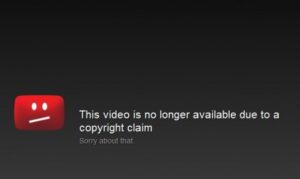When you think of Nintendo, you think Mario, Pokemon, Metroid. When you think of Sega, you think Sonic. When you think of Marvel, you think Iron Man, Spider-Man, The Hulk. When you think of DC Comics, you think of Superman, Batman, Wonder Woman. These are all intellectual properties protected under a law statute known as Copyright – literally, the right to copy (as in, reproduce.)
This concept protects the creators of content from it being outright stolen. By creating something, you own the right to copy it – this very article I’m writing, for example, is owned by me – I can reproduce it as I wish, but if you were to copy it and post it on your own website, you would be violating my copyright of it. If I really wanted to make an issue out of it, I would have legal basis to do so. Would it be a ridiculous thing to do? Sure, but I have all right to do it.
The same is true of music, movies, television, books.. anything, really. You can’t just go on YouTube, for example, and upload a TV show, or a movie, unless you own the copyright to it or have been authorized to do such. It’s just that simple and makes sense. At least, it should make sense, but it seems like many, many people out there (mostly kids, understandably) have absolutely no idea what copyright is and isn’t.
This stems primarily from a concept in copyright law known as “fair use” where, for purposes of parody, commentary, criticism, etc, portions of content may be used. This, too, would seem like a basic idea, but it clearly eludes the understanding of many people.
While I’m no lawyer, the basics of copyright law are easy for anyone to understand, and so here I thought it worthwhile to discuss the concept in a pretty straightforward way. Also, I’m quite aware there is an irony in me writing about this when many articles on my site use image content that is not mine. If the copyright holder wishes those images removed, I will gladly do so, but as it stands I try to attribute where possible.
Let’s focus right now on YouTube, one of the major places for such confusion. YouTube features automated systems used by major media outlets to automatically detect their content if it is uploaded to the platform, and take action against it if they see fit. This could be anything from an advertisement being put on the video in question, to it being blocked in some nations, to even an actual take down of the content.
The sad thing I see often on videos, once again often uploaded by kids who don’t understand the concept, are inane statements like “no copyright intended” or something, even though they have just uploaded a video containing, let’s say, music from one source, mixed to clips from a TV show. In this scenario, the person has made unique content, sure, but it is using materials owned by someone else, without authorization – the music publisher can file claim against the music, while the owners of the television program can file claim against the clips used.
Of course fair use can be claimed on this, which it often is. This is past the point where I can make a claim as to what is or isn’t fair use, as that’s for the legal process to decide as time passes, but I can say that historically such content doesn’t qualify. I personally feel the companies would be in the right to take down such a video, but that is just me.
Now, let’s compare this to a YouTube video where someone may disagree with a video on a sensitive subject, and they make their own video discussing points and counterpoints. It uses samples of the original video for comparisons sake – this is more likely to be protected under fair use as it is using segments of the original material for commentary, criticism, or other derivative but still original work.
Of course gray areas exist, and there are as many variations on usage of copyrighted materials as their area videos on YouTube, but these two are very common, very prime examples of where things can be seen on the side of the copyright owner, and where things can be seen on the side of fair use.
Yes, many of my videos use copyrighted content in ways that probably are not fair use. If a company claims against such, I’ll take it for what it is. This rarely happens, however, since I tend to edit things in such a way that no one seems to mind the contents usage – that or I avoid the automatic systems. In any case, I don’t get hit with claims and I’m not uploading entire songs, videos, what have you, that aren’t mine. One time I got a claim for music used in a video game I was commenting on, and that claim was removed when I counter claimed under fair use (as the music is part of the video game being commented on.) The game has since changed music, making me wonder if the company got tired of the music triggering such, or something else. Who knows.
In Part 2, I’ll take a look at what happens when fans try to make the video games that the big companies don’t want to.


This looks like it will be an interesting series of articles to read. Seems like there’ll be plenty of examples you could use in the second part. Will you focus on the more popular ones like AMR2 and Pokémon Uranium as examles or perhaps mention some of the terrible ripoffs on Google Play too.